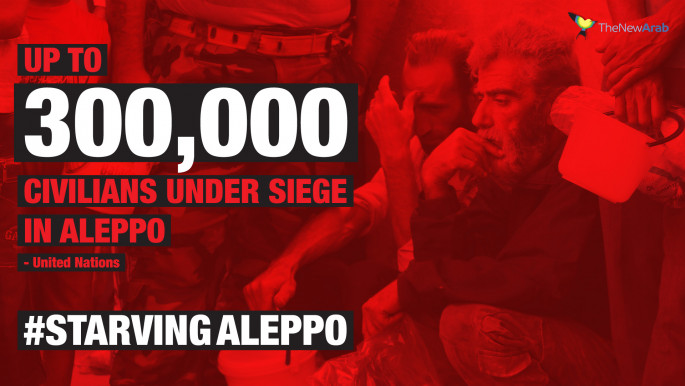Aleppo: Syrian rebels okay 48-hour truce 'if implemented nationwide'
But the truce must be expanded and include all Syrian areas coming under bombardment, General Ahmad Berri, rebel Free Syrian Army chief of staff, told The New Arab on Thursday, adding that aid must also be allowed into areas besieged by the regime such as Daraya, Madaya and al-Waer.
"The opposition agree to open a humanitarian corridor in Aleppo through the Ramussa district, and would oversee deliver of aid to civilians in both rebel- and regime-held areas," he added.
Berri accused the international community and Russia of helping the regime through ceasefire requests whenever its forces go on the defensive. "We did not see the same when the regime besieged more than 300,000 civilians in [rebel-held] eastern Aleppo," he said.
Earlier, Staffan de Mistura said a 48-hour pause in fighting in the northern city of Aleppo was the main goal for a meeting Thursday of major and regional powers tasked with resurrecting a collapsed cessation of hostilities accord.
Aid convoys have been unable to reach civilians trapped in besieged areas of Syria this month and a humanitarian task force has been suspended to prod big powers to double down on securing a ceasefire, the UN peace envoy on Syria said.
"That would require some heavy lifting from not only the two co-chairs (Russia and the United States) but also those who have an influence on those who are fighting on the ground." Russia and the United States back opposite sides in the civil war.
 |
Aleppo, split into rebel- and government-controlled areas, has become the focus of fighting in Syria's five-year civil war |  |
Aid blocked
 |
De Mistura spoke after suspending the weekly meeting of the humanitarian task force after eight minutes "as a sign of deep unhappiness" with the failure to restore calm to enable aid deliveries to stricken civilians in besieged districts.
The European Union's top diplomat, Federica Mogherini, also called for an immediate halt to fighting in Aleppo to allow for medical evacuations, aid deliveries and necessary repairs to water and electricity infrastructure.
Aleppo, split into rebel- and government-controlled areas, has become the focus of fighting in Syria's five-year civil war. Up to two million people on both sides lack access to clean water after infrastructure was damaged in bombing.
Escalating violence in what was Syria's most populous pre-war city and biggest commercial hub has caused Geneva peace talks overseen by De Mistura to break down.
The Syrian opposition has said it wants to see a credible pause in the bloodshed, as well as improved humanitarian aid access, before peace talks can resume.
Around 590,200 people are now living in besieged areas of Syria, according to UN figures.
Aid convoys have ground to a halt during August, and the only supplies being delivered are by air drops to Deir ez-Zor, the government-controlled city of 200,000 in the east under siege by IS, de Mistura said.
Moreover, no aid has reached four besieged towns covered by a local agreement in the last 110 days, he said. These were rebel-besieged al-Foua and Kefraya in Idlib province, and government-besieged Madaya and Zabadani near Damascus.
"The pause should also be accompanied by humanitarian aid ... and evacuation of medical cases," de Mistura said.
In all, 16 patients in Madaya and 15 in al-Foua and Kefraya are awaiting emergency medical evacuation, the WHO representative in Damascus Elizabeth Hoff said.
"The government is in total agreement with the evacuation and the (Syrian Arab Red Crescent) is working with different armed opposition groups to make sure we have evacuations as soon as possible ... I hope Friday," Hoff told Reuters.
Agencies contributed



